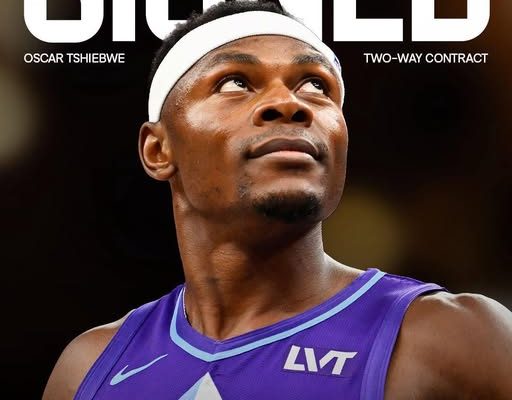When Oscar Tshiebwe declared for the NBA Draft, few knew exactly how his career trajectory would play out. He had been one of the most dominant forces in college basketball during his time at Kentucky, putting up numbers that hadn’t been seen in decades. His relentlessness on the glass, motor that never seemed to stop, and physical presence in the paint made him a fan favorite in Lexington and one of the most recognizable names in college basketball. Still, the leap to the NBA is never straightforward, especially for big men whose skill sets are questioned in an era where floor spacing, versatility, and outside shooting have become the pillars of the modern game. That’s why Tshiebwe’s latest contract news, a re-signing with the Utah Jazz, stands as a major career boost for a player who has worked relentlessly to prove he belongs. The Jazz, a team in the midst of retooling their roster, clearly saw enough promise in Tshiebwe’s rookie campaign to bring him back, and that decision sends a strong message about his growth, value, and potential role in the league moving forward.
Tshiebwe’s journey to this point has been anything but conventional. Born in the Democratic Republic of Congo, his early life was defined by resilience, discipline, and a desire to provide a better life for his family. That determination translated onto the basketball court when he arrived in the United States as a teenager, immediately turning heads with his strength and rebounding instincts. At West Virginia, under coach Bob Huggins, he established himself as a force, but it was his transfer to Kentucky that cemented his legacy. In Lexington, Tshiebwe became not only a statistical marvel but also a household name. He earned national player of the year honors after averaging absurd rebounding numbers that often doubled what entire opposing frontcourts were producing. His hands seemed to vacuum every missed shot, and his energy was unmatched. But despite his dominance at the college level, questions lingered about how his game would translate to the NBA. Scouts noted his limited shooting range, his undersized frame for a center, and his defensive foot speed.
When Tshiebwe went undrafted, it was a humbling reality check, though not entirely surprising given the trends of the modern NBA. However, his undrafted status did not keep him out of the league. Utah took a chance on him, initially through summer league opportunities and later by bringing him into their system. For a team looking to develop young talent while building around foundational pieces, the Jazz offered Tshiebwe exactly what he needed: a chance to prove his worth with consistent effort, hard work, and a willingness to learn. And that’s exactly what he did in his first year, making incremental improvements, earning minutes through hustle, and quickly endearing himself to Utah’s fanbase in much the same way he had at Kentucky.
Re-signing with the Jazz represents far more than just another paycheck for Tshiebwe. It’s validation that the traits which defined him in college—his work ethic, energy, and commitment—are translating to the professional game. Utah’s decision to keep him signals that the organization values what he brings to the roster. In today’s NBA, where specialized roles can carve out lengthy careers, Tshiebwe has positioned himself as a reliable energy big, someone who can change the momentum of games with rebounding, second-chance opportunities, and an undeniable presence in the paint. For the Jazz, keeping Tshiebwe ensures that they maintain a player who fills gaps that stats don’t always quantify but coaches and teammates recognize immediately.
The Jazz themselves are in an interesting position as a franchise. Since the trades that sent Donovan Mitchell and Rudy Gobert elsewhere, Utah has been in a retooling phase, balancing young talent with veteran leadership while keeping flexibility for the future. They have intriguing young stars in Lauri Markkanen and Keyonte George, and their front office has stockpiled draft picks as they look to build sustainably. In that environment, a player like Tshiebwe has the opportunity to grow without the overwhelming pressure of being thrust into a starring role too early. Instead, he can carve out his identity, refine his game, and gradually expand his skill set while contributing in ways that don’t always make headlines but matter tremendously in the flow of a season. His re-signing signals continuity for the Jazz, giving them a reliable piece who knows the system and is eager to keep improving.
For Tshiebwe personally, this deal offers stability and a chance to build his NBA résumé. Many undrafted players find themselves bouncing from team to team, unable to establish a foothold. By securing another contract with Utah, Tshiebwe avoids that uncertainty and instead builds on a foundation he already knows. The Jazz organization has clearly invested in his development, and continuity with coaching staff and teammates will allow him to focus on honing his craft. That’s crucial for a player whose offensive game is still evolving. While rebounding and interior presence are his bread and butter, Tshiebwe has been working on developing a mid-range jumper, improving his free-throw shooting, and refining his defensive positioning to adapt to the speed and spacing of NBA offenses. With the Jazz committed to his growth, he has a real shot at turning perceived weaknesses into strengths, or at least mitigating them enough to make his elite rebounding an undeniable asset worth keeping on the floor.
This moment is also significant for Kentucky basketball fans, who continue to follow the careers of their former stars with intense loyalty. In Lexington, Tshiebwe wasn’t just another player—he was a phenomenon. His humility, faith, and tireless effort made him beloved by Big Blue Nation. Seeing him succeed at the professional level validates the faith those fans placed in him and serves as a reminder of the bridge Kentucky provides between college stardom and professional dreams. For many Kentucky greats, the NBA has been a place where reputations are tested, and while not every Wildcat thrives, Tshiebwe’s perseverance stands as an inspiring narrative. His re-signing with Utah is not just a win for him but also a moment of pride for those who cheered for him in Rupp Arena night after night.
From a basketball perspective, Tshiebwe’s role going forward with the Jazz is likely to grow incrementally. He may not become a primary scoring option, but his minutes can increase as he continues to prove he can defend without fouling, switch more effectively on pick-and-rolls, and provide consistent rebounding against NBA-caliber bigs. Coaches at every level love players they can count on for effort and consistency, and Tshiebwe has always provided that. With a strong work ethic, it’s not far-fetched to imagine him carving out a career similar to other rebounding specialists and hustle bigs who extended their time in the league well beyond what initial scouting reports projected.


